- Home
- S. D. Perry
Star Trek - TOS - Section 31 - Cloak Page 2
Star Trek - TOS - Section 31 - Cloak Read online
Page 2
The captain triggered the com. "Kirk here. Go ahead, Scotty."
"We've just passed warp nine, sir, and she's starting to strain. I can only give you another two, three minutes at most before we risk an overload."
"Which is it, two or three?"
A hesitation, then Mr. Scott's anxious reply. "I can promise you two. Much more than that is wishful thinking, sir."
Spock's own estimates were higher by just under a minute but he inwardly deferred to the engineer's appraisal, figuring it into matters. Though Mr. Scott's consistently emotional reaction to crisis was impractical, his competence was indisputable.
"What about the tractor beam?" the captain asked, frowning.
"We're running it off the phaser reserves."
The captain stood up, his stance and tone the epitome of command, his decision made.
"We have only one option, and not much time," he said firmly, raising his voice to be heard clearly over the engines. "Chekov, target a photon torpedo on that breach, lowest possible yield. Your aim is going to have to be absolutely precise, so don't lock until you're sure. I want to open that hole wider, not blow up the ship. Can you do it?"
Mr. Chekov straightened his shoulders, lifting his chin and lowering it in a brisk nod. His response suggested absolute confidence in his own abilities. "It's no problem, sir."
"Sulu, the instant the Sphinx is stable enough to match, do it, don't wait for my command. Spock, same goes for you--I want that tractor beam locked on as soon as it's possible. Scotty, start decelerating the second we get a grip, slow and steady. We need absolute precision on this, gentlemen, so watch for your cues."
Spock acknowledged the orders along with the others, fascinated as always with the incredible self assurance that the captain so easily projected ... as well as his unwavering faith in the abilities of the people he commanded. By simply expecting their best, he somehow always managed to get it--as though the expectation itself inspired consistently peak performance.
In the years they'd served together, Spock had come to know that the captain was the inspiration, his crew proud to be under his command and motivated to meet his standards. In that, emotion played no small part... a small but compelling fact that Spock had pondered on more than one occasion, considering the things he had done or been willing to do for Jim Kirk.
"Torpedo locked on target," the navigator said, sounding no less sure of himself than when he'd accepted the challenge.
The captain stared hard at the screen, then nodded once.
"Fire," he said, and a burst of light flashed from the Enterprise, setting his plan into motion.
After establishing a repeating broadband explanation and instruction loop to the Sphinx, for what it was worth, Lieutenant Uhura cleared channels from all decks for activity reports and turned in her seat to look at the viewscreen. Until her next update to Starfleet, there was nothing to do but watch.
And pray, she amended silently, sending out a good thought for the troubled ship just as the captain gave the word and Mr. Chekov fired.
A bolt of brilliance and then the Sphinx was lurching wildly, a tiny boat on storming seas. It veered sharply from its course, perhaps pushed by the billow of freezing moisture and gas that erupted from its stern and instantly disappeared in the passing dark.
"Got it!" Chekov exclaimed, and though she couldn't see his face, she could hear boyish triumph in his voice, even over the intense rumbling and whining of the Enterprise's, engines.
"Stay with her, Mr. Sulu," Captain Kirk said, not taking his gaze from the screen. "Spock?"
"Mr. Chekov is correct," the Vulcan responded, the cool light from his console bathing his face in flickering green, his raised voice just as cool. "No suggestion of internal breach ... and the sensors report a drastic decline in the ship's oxygen purge. The Sphinx's flight should stabilize within--sixty seconds."
As if on cue, Mr. Scott's thick brogue spilled onto the bridge and into her ear simultaneously, stilling a short-lived flutter of hope. Uhura reflexively tuned out everything but what she heard from her own station, concentrating, holding the earpiece firmly in place in spite of the engineer's near shout.
"Captain, I can give you another minute, no more! I'm already pushing as hard as I can, there's nothing else I can do!" The engineer's warnings over sustained high warp were no less terrifying for their familiarity. Uhura felt an icy hand clutch at her heart and drum its fingers there, the mental image of the Enterprise'& death clear in her mind, an image she'd once dreamed and had never forgotten--the starship rocketing through the freezing dark like a sculpture of ice, pieces of her shedding away as though she were melting, the final silent explosion and the scattering glitter of four hundred lives. So many people turned into so much dust as simply as that, tiny motes propelled forever through a black vacuum, far, far from home The captain spoke quickly. "Try crossing your fingers, Mr. Scott."
Even tense and frustrated, Captain Kirk had a gift for stilling her fears. Uhura took a deep breath and mentally crossed her own fingers.
The excruciating seconds ticked away, the sound of the Enterprise's suffering engines becoming choppy, Sulu's back and shoulders stiff as he waited to do his part. Everyone else watched the screen anxiously except for Mr. Spock, still bent over his reader, one hand on the tractor-beam controls.
"Flight pattern is stabilizing," Mr. Spock said, and the laboring engines somehow managed to respond to Sulu's light touch, the painful, strained sound rising another impossible notch as the Enterprise slid forward, smoothly closing the gap.
The rest happened fast. Even as they appeared to match course next to the smaller ship, Mr. Scott shouted in Uhura's ear and across the bridge. "Captain, I'll have to shut it all down now or--" "Just a few more seconds, Scotty," the captain interrupted, firmly but somehow absently, his entire focus on the Sphinx.
"Matched and locked," Sulu said.
Staring into his station's raised screen, Mr. Spock's right hand quickly tapped across several switches. "Tractor beam locked on, Captain."
Within a few seconds, the rumbling roar of their engines began to subside, easing back to warp eight, and Uhura remembered to breathe again. The small ship stayed with them as Mr. Scott slowly and steadily powered down the warp engines.
Captain Kirk turned, smiling, taking his seat as if the brief but dramatic encounter were a matter of routine. "Excellent work, gentlemen. Lieutenant, pass the word along to the crew, if you would ..."
The captain kept talking, giving orders to helm and engineering, but Uhura was already on open com and barely heard him, concentrating on her work. She quickly relayed the information ship wide speaking and listening at once as reports from every deck and department flooded in. Except for a few overheated circuit boards and drive coils in engineering, the Enterprise was undamaged.
Uhura stated as much to the captain and started logging the reports, relieved and grateful that the Sphinx had been saved. As always when danger presented itself and then left them, defeated, she was glad to be part of such a talented and resourceful crew--a feeling more than a thought, a kind of security that she only rarely acknowledged. Entering data into the computer was a simple task but one that re20 quired her full attention, so she wasn't thinking about herself or anything else as she worked--and she didn't pick up on what Mr. Spock was saying until Captain Kirk repeated it, his tone of dismay jolting her from her trance of efficiency.
"None? Spock, are you sure?"
"Quite," Mr. Spock replied, and though he displayed no emotion, the lines of his carefully stoic face seemed deeper somehow. "There are no survivors aboard the Sphinx; Captain Casden and his crew are dead."
Leonard McCoy reached the transporter room just in time to hear the tail end of the initial atmospheric report from one of Scotty's boys, his suit helmet in one hand. Ensign Burton or Burdock, McCoy couldn't remember, the kid was relatively new to the Enterprise. Spock was reading from the young man's tricorder while Jim listened intently, the trio standing near the tra
nsporter controls. The other engineering tech, Rick Washburn, was shedding his environmental suit in the far corner. Two security guards waited on the transporter platform.
"... see anyone, but we didn't leave engineering, either," the young man was saying.
"We couldn't get out, the door was jammed from the outside," Washburn added. "It was definitely life support failure, but it could've been fixed if someone had been able to get to it in time. It only took us twenty minutes."
"No sign of airborne toxins or disease," Spock said, snapping the tricorder off and slinging it over his shoulder as McCoy approached. The captain thanked and dismissed the two young men, nodding an unsmiling acknowledgment at McCoy.
And no wonder. A seemingly senseless tragedy, no rhyme or reason to it, and a mystery to boot. He knew Jim well enough to know he wouldn't rest until he got to the bottom of it... although he wasn't sure why the captain wanted him on the team. Or security guards, for that matter. "Doctor," Spock said.
"I thought you said everyone on the Sphinx was dead," McCoy said mildly, addressing the captain but nodding politely at Spock in turn. It obviously wasn't a good day for sparring with the Vulcan, even if he wanted to.
Jim nodded once, his mouth set in a tight line. "They are, and it looks like life-support failure ... but I want to know that for a fact."
McCoy tilted his head toward the security guards. "Are we expecting trouble?"
"No, but since we don't know how their computer is operating, we may need to search the ship room by room," he answered, stepping toward the transporters. "We need the extra eyes."
Spock and McCoy followed, taking places on either side of the captain, the doctor feeling the all too-familiar unease as he stepped onto the platform. He suppressed his natural impulse to grumble about the transporter; if Spock overheard him, he'd have to sit through another damned lecture on science and safety statistics, a prospect even less appealing than being scrambled and reassembled by a computer.
"Energize," Jim said, nodding at the operator.
A shimmering haze, the thrumming of the trans22 porter in operation, and they were standing on the bridge of the Centaurus-class starship, the rectangular room about half the size of the Enterprise's bridge. Only the emergency lights appeared to be operating, the station consoles all lifeless, dark and silent--and it was cold, damn near freezing. Life support was back on, maybe, but the new atmosphere obviously hadn't had time to warm up yet. McCoy scowled, his arms instantly pebbling--and forgot the cold as he saw the bodies. Two men in a sprawled heap not far from the bridge doors, half hidden by a standing console. One was in a command uniform, the other wearing an engineering jumpsuit.
"Bones," Jim said, but McCoy was already moving toward them, his medical tricorder and scanner in hand.
The doctor crouched next to the bodies, running the scanner over each, making his own observations as the tricorder processed the information. The man in uniform was a captain, presumably the captain, one Jack Casden. Casden held a broken oxygen mask in one hand, and had been hit in the chest by phaser fire at near point-blank range; the shot would have killed him instantly. The other man still clutched the offending weapon; he was cyanotic, and had died recently. From the cell deterioration, no more than two hours had passed since his death, presumably by asphyxiation.
McCoy bent closer to the engineer, studying his face. There was a slender thread of abraded skin that ran horizontally across the bridge of his nose... which would undoubtedly line up with the upper lip of the oxygen mask that the captain held in one frozen hand.
The engineer shot Casden, Casden broke the engineer's mask... but why? And who started it?
McCoy sat back on his heels, frowning, just as Spock piped up from one of the consoles that lined the far wall, his statement only adding to the mystery they'd beamed into.
"Captain, the ship's computer banks have been erased. Every recorded file has been deleted, from personnel records to maintenance reports."
"Mechanical failure?" Jim asked, looking as perplexed as McCoy felt.
"Negative," Spock said calmly. "From the chronological pattern of expungement, it could only be an act of sabotage."
McCoy looked back at the dead captain and his killer, the chill of his flesh nothing compared with the chill of apprehension that ran up his spine.
"What the hell happened here?" Jim asked softly, but no one answered, the Sphinx as enigmatically silent as its namesake.
Chapter Three
Ensigns Burdock and Washburn hadn't seen anyone in the Sphinx's main engineering room because they hadn't looked in the supply closet. When Kirk finally managed to un jam the door--as deliberately jammed as the entrance to engineering had been--he found two men and a woman inside, engineers, huddled together and as cold as ice. They had suffocated, their lips and fingernails the same ghastly shade of blue as those of everyone else on board.
Except for Casden.
Killed by one of his own, and perhaps with reason. Kirk didn't want to consider it, but he couldn't help wondering if Bones was right. The doctor had put forth a disturbing theory before they'd split up to search the ship, suggesting that Casden had shut off life-support and then been tracked down and shot by a survivor, the engineer. It would certainly explain a few things, a mad captain destroying himself and taking his ship and crew with him--madness needed no motive--but it also raised even more questions, the logistics alone giving pause ... and although he had nothing to back him up, no clear evidence, Kirk's instincts were telling him there was much more to the story behind the catastrophe, behind the terrible silence that had greeted their arrival.
He turned away from the pathetic trio in the supply closet, saddened and frustrated at the terrible waste, his heart pounding with it. The cold and poorly lit room was completely devoid of life, except for the mute blinking of the life-support controls across from him, a small handful of lights in a wall of equipment that should have been glittering with power. Knowing that the entire tragedy could have been avoided with just twenty minutes of work by a trained engineer, three of them trapped less than four meters away--it was intolerable.
An entire crew, dead, no accident and no explanation. Kirk walked slowly toward the live panel, thinking about the erased computer banks, wondering what they could have learned from the lost files. Spock had made it clear that it hadn't been a straight-across wipe, mat some thought had gone into it... and it doesn't fit. The kind of psychotic personality it would take, to commit mass murder and destroy your awn ship--would that kind of man take the time and effort to selectively delete files? And if you meant to blow up your own ship, why bother deleting them at all?
He stopped in front of the panel, staring down at it without really seeing, suddenly thinking about the routine physicals that McCoy was going to be conducting over the next few days. Thinking about the standard dermal-optic test required for all personnel, a test that would provide ample warning of an impending psychosis. People didn't just snap and turn violent, not without some lead-up, not unless it was some kind of an affliction or disease ... but the tricorder readings showed nothing unusual. With the medical files erased, there was no way to tell when the Sphinx crew had last undergone any kind of psychiatric evaluation, but certainly not more than six months, and most starship captains had them quarterly His communicator signaled. Kirk flipped it open, its gentle cricket sound overly loud in the silent room.
"Kirk here."
"Spock here, Captain. The doctor and security personnel have returned to the bridge, reporting thirty-two deaths in addition to the two men here."
"Add three more to the count, Mr. Spock," Kirk said heavily, gazing at the repaired life-support system as he spoke. "I'm on my way now ..."
He trailed off, peering closer at the console. The controls that regulated atmosphere and temperature, basic life-support, seemed barely damaged... though the panels next to it had been smashed to pieces, what could only be the reaction-chamber overrides--as though life-support wasn 't the target at al
l.
"Spock .. . have Mr. Scott bring a team over to assess the physical damage to the ship," Kirk said slowly, not sure what he was looking for, not yet. "I want everything checked, bow to stern--and have him run tests for unusual energy fields or readings, anything out of the ordinary. Kirk out."
He took a final, lingering look at the three people curled together in death, hoping that there had been some comfort for them in not dying alone--and as he turned to leave engineering, he realized that he was angry, furious, in fact. Someone, some black and twisted mind, had plotted and carried out this senseless nightmare, making these people die cold and in the dark.
Kirk wouldn't--couldn't--let it go unpunished. If it was within his power, he would find out who was responsible and see that they were brought to justice, whatever it took. If it was Casden, he got off easy.
Although he was certain of his findings to a negligible percentage, Spock went through the entire process a second time--accessing the personnel files for each crew member of the Sphinx and cross-referencing them with Dr. McCoy's DNA samples, collected in their search of the small ship.
The science officer sat alone in a seldom-used conference room on deck nine, methodically reviewing each match with the computer. His presence was not required on the bridge, and though his quarters were certainly more comfortable than the room he'd chosen, he often preferred to work in such settings-the bland environment provided no distraction, and while his concentration skills weren't lacking, he'd found that the complete absence of aesthetic quality frequently enhanced his ability to focus.
When Spock had concluded his task a second time, the results undeviating, he left the conference room and started for the bridge to tell the captain. The information was important, perhaps crucial to the Sphinx investigation, and Spock also wanted leave to return to the ship; his discovery required another search.
He reached a turbolift and stepped on, requesting the bridge. Alone on the lift, his thoughts centered around several interesting possibilities he hadn't yet explored, as to the creation of the Sphinx's current circumstances. Unfortunately, he didn't have enough information to fully consider any one of them--and though a number of his theories were highly improbable, he couldn't decisively exclude any, either. Engineer Scott's report would undoubtedly change things.

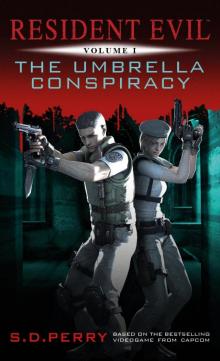 The Umbrella Conspiracy
The Umbrella Conspiracy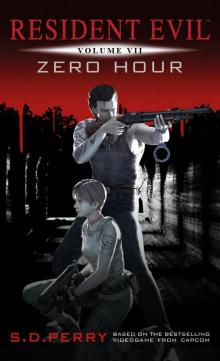 Zero Hour
Zero Hour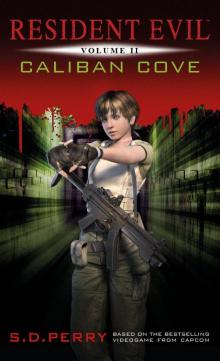 Caliban Cove
Caliban Cove Code: Veronica
Code: Veronica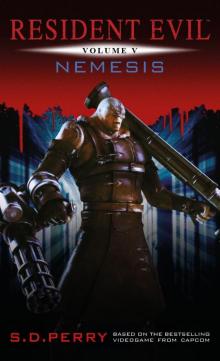 Nemesis
Nemesis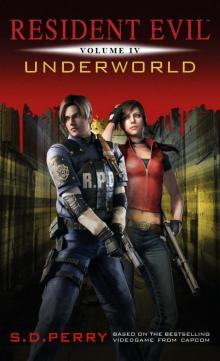 Underworld
Underworld The Summer Man
The Summer Man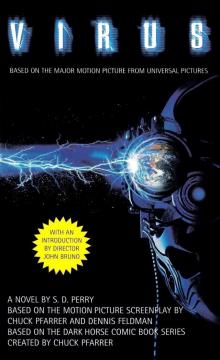 Virus
Virus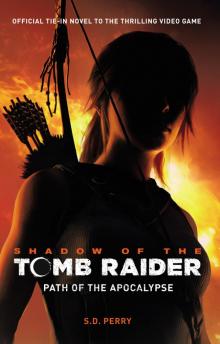 Shadow of the Tomb Raider--Path of the Apocalypse
Shadow of the Tomb Raider--Path of the Apocalypse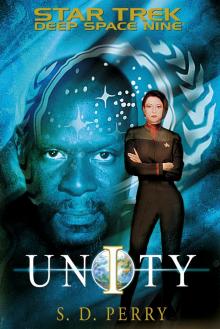 Unity
Unity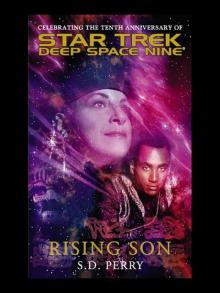 Rising Son
Rising Son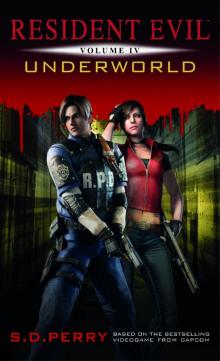 Resident Evil: Underworld
Resident Evil: Underworld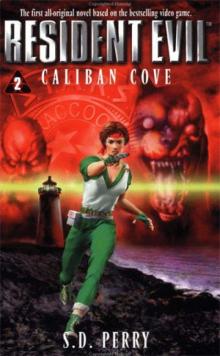 Resident Evil – Caliban Cove
Resident Evil – Caliban Cove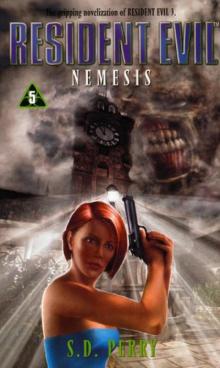 Resident Evil – Nemesis
Resident Evil – Nemesis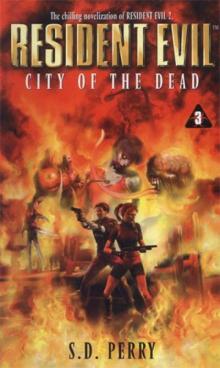 Resident Evil – City of the Dead
Resident Evil – City of the Dead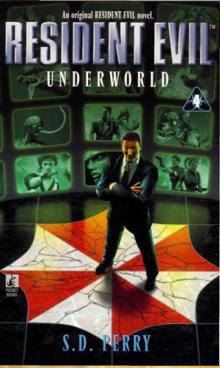 Resident Evil – Underworld
Resident Evil – Underworld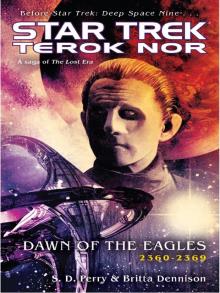 Star Trek: Terok Nor 03: Dawn of the Eagles
Star Trek: Terok Nor 03: Dawn of the Eagles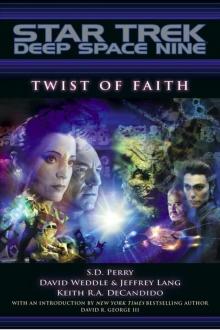 Twist of Faith
Twist of Faith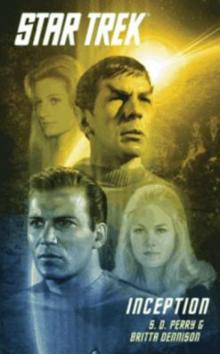 Star Trek: Inception
Star Trek: Inception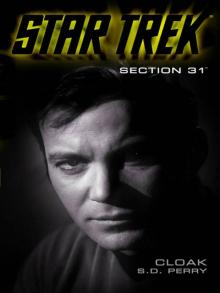 Cloak
Cloak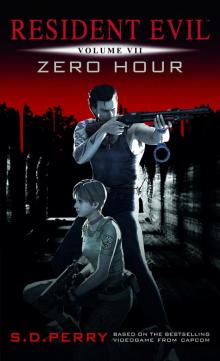 Resident Evil
Resident Evil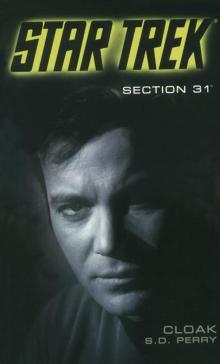 Star Trek - TOS - Section 31 - Cloak
Star Trek - TOS - Section 31 - Cloak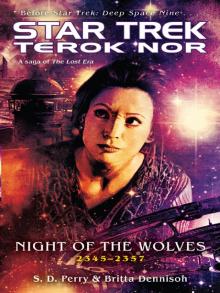 Star Trek: Terok Nor 02: Night of the Wolves
Star Trek: Terok Nor 02: Night of the Wolves